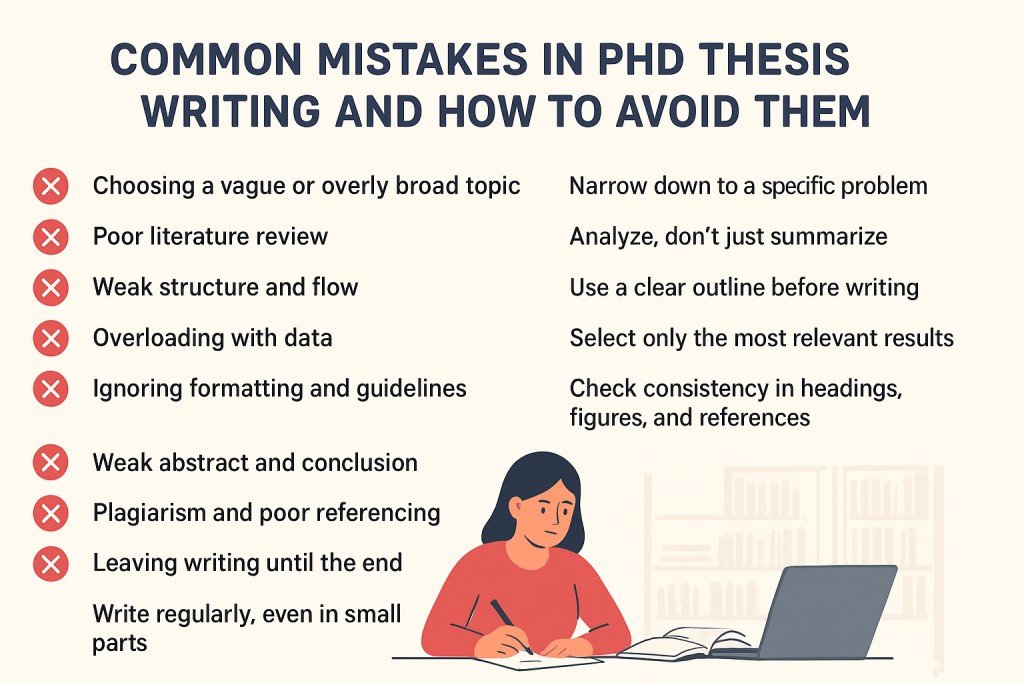Writing a PhD thesis is one of the most challenging tasks in a researcher’s life. It’s not just about putting research results together—it’s about presenting them in a clear, logical, and convincing way. Many students spend years on research but struggle when it comes to writing, often making mistakes that cost them time, effort, and even confidence.
In this post, we’ll look at the most common mistakes in PhD thesis writing—and more importantly, how to avoid them.
1. Choosing a Vague or Overly Broad Topic
🔴 The mistake: Picking a research topic that is too general, like “AI in Healthcare”, instead of focusing on a specific question. This makes the thesis unfocused and difficult to complete.
✅ How to avoid it: Narrow down to a specific problem. For example, “Deep learning for early detection of lung cancer in CT scans.” A focused thesis is easier to write and contributes more clearly to research.
2. Poor Literature Review
🔴 The mistake: Writing a literature review that is either:
- Too descriptive (just summaries of other works), or
- Outdated, missing the latest research.
✅ How to avoid it:
- Analyze, don’t just summarize—show how previous work connects to your study.
- Use recent, high-quality sources (last 5 years where possible).
- End the review by identifying the research gap.
3. Weak Structure and Flow
🔴 The mistake: Writing chapters like separate essays, without clear connections. Readers (and examiners) get lost.
✅ How to avoid it:
- Use a clear outline before writing.
- Make sure each chapter answers part of your main research question.
- Add linking sentences between chapters (e.g., “The next chapter builds on this method to test…”).
4. Overloading with Data
🔴 The mistake: Including every dataset, experiment, or table from your research. This makes the thesis heavy and repetitive.
✅ How to avoid it:
- Select only the most relevant results.
- Use appendices for raw data or secondary findings.
- Focus on analysis, not just presentation of numbers.
5. Ignoring Formatting and Guidelines
🔴 The mistake: Submitting a thesis without checking university guidelines for formatting, font size, margins, citation style, etc.
✅ How to avoid it:
- Download the official formatting guide early.
- Use reference managers like Zotero, Mendeley, or EndNote.
- Check consistency in headings, figures, and references.
6. Weak Abstract and Conclusion
🔴 The mistake:
- Abstract too vague (or written last minute).
- Conclusion just repeating results, without showing the “big picture.”
✅ How to avoid it:
- Abstract: Write it as a “mini-thesis”—problem, method, key result, contribution.
- Conclusion: Highlight what you contributed to knowledge, and what future research can build on it.
7. Plagiarism and Poor Referencing
🔴 The mistake: Copy-pasting from articles or reusing parts of your own published work without citation. This can lead to serious consequences.
✅ How to avoid it:
- Always paraphrase and cite sources.
- Use plagiarism checkers (Turnitin, iThenticate).
- Be careful with self-plagiarism—cite your own papers too.
8. Leaving Writing Until the End
🔴 The mistake: Doing research for years but postponing writing until the final months. This leads to rushed, unclear chapters.
✅ How to avoid it:
- Write regularly, even in small parts.
- Maintain a “research diary” where you note down ideas, results, and reflections.
- Treat writing as part of research, not something separate.
Final Thoughts
A PhD thesis is not just a requirement—it’s the story of your research journey. Avoiding these common mistakes will save you time, stress, and rewrites. Remember, clarity and focus are just as important as originality.
🚀 Key advice: Start early, stay organized, keep it focused, and seek feedback often.
Your thesis doesn’t need to be perfect—it needs to be complete, clear, and defensible.

Leave a Reply